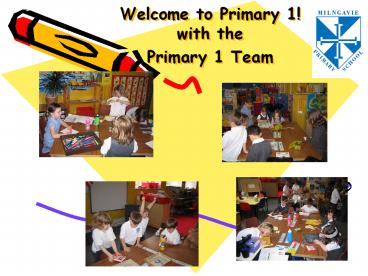Welcome to Primary 1! with the Primary 1 Team - PowerPoint PPT Presentation
1 / 20
Title:
Welcome to Primary 1! with the Primary 1 Team
Description:
Welcome to Primary 1! with the Primary 1 Team Our Team Mrs Stilwell Mrs Yacoubian Mrs Gilchrist Mrs Macfarlane Mrs Ingham Classroom Assistant Mrs Benson ... – PowerPoint PPT presentation
Number of Views:146
Avg rating:3.0/5.0
Title: Welcome to Primary 1! with the Primary 1 Team
1
Welcome to Primary 1! with the Primary 1 Team
2
Our Team
- Mrs Stilwell
- Mrs Yacoubian
- Mrs Gilchrist
- Mrs Macfarlane
- Mrs Ingham Classroom Assistant
- Mrs Benson Support for Learning
Primary 1, room 1
Primary 1, room 2
3
Our Day
- Organisation
- Soft start /Reading
- Mental Maths /Odds and Evens
- Active maths
- Active language phonics, reading
- Handwriting
- Creative writing
- Story telling
- Topic work
In amongst this we have Science Music Gym ICT Dra
ma Circle Time
4
Organisation
- Self registration
- From Me to You
- Snack
- Crayons and pencils ready
5
Active Learning Zone
- Learning which engages and challenges childrens
thinking using real-life and imaginary
situations. It takes full advantage of the
opportunities for learning presented by - spontaneous play
- planned, purposeful play
- investigating and exploring
- events and life experiences
- focused learning and teaching
"I hear and I forget. I see and I remember. I do
and I understand." -- Confucius
6
- First 30 45mins Soft Start children have
free choice as to the activities they participate
in. These may be structured or unstructured - At present the majority of activities are less
structured but will develop more structure as the
year progresses - i.e. Free play in water will develop into
activities related to volume
7
Mental Maths/ Odd and Evens
- Work on numbers 1 10 and then 1 20 using
- number fans
- whiteboards and pens
- number line
- interactive whiteboard
- Odd and Evens (visualisation of number)
8
Reading
- Use of three integrated strategies
- Phonics - Fast Phonics First
- High frequency words
- Reading book skills
- On this basis reading grows
9
1. Fast Phonics First (phonics)
- Each letter is taught in a very active way using
a variety of approaches - As we move along we learn that two letters
together can make a sound - When we have learnt 7 or 8 letters we start
putting these together and blending - c at
- p at
- s at
10
- We learn that there are vowels and that vowels
have two sounds. - Using all this information we very quickly learn
to decode words - Every night as part of our reading homework you
will have the opportunity to practise this with
your child using the sound board - Parents can choose to buy a magnetic pack similar
to the ones used in class if they wish. - An information sheet will come home when it is
time to start this
11
2. High Frequency Words
- We have compiled a set of 40 words that your
child needs to know to progress with his/her
reading and writing skills - You will be given 2/3 words each week to learn
- You will find these words in the reading diary
- At present we are learning the common reading
book words Kipper, Biff and Chip
12
3. Reading Book Skills
- It must be fun
- Discuss the story with your child
- First night read the book to your child
- Second night - read together
- Third night your child reads it
- If your child wishes to read it every night then
this is fine.
13
- It is vital that you carry out all three aspects
of the reading to support your child - Approximately 2 books a week
14
Money and Lunch
- Always hand in any money in a marked envelope
- Money for bistro should come in a purse/wallet
- Please write on the From Me to You each day what
your child is doing for lunch this can be a
stressful time for your child
15
Staffing
- Visiting Specialists
- P.E. Mrs Lindsay
- Music Mrs Yeoman
- Science Mrs Macfarlane
- In class support
- Mrs Ingham Classroom Assistant
- Mrs Benson Support for Learning
- (Support staff are also out in the playground)
16
- Other Information
- Any issues will be dealt with immediately
- Appointments can be made before school - 8.50am
- A quick chat at the gate at home time can often
be enough to resolve any issues - If your child needs help we will meet with you
prior to parents night - Parents night is a nice time to come and view
your childs classroom and work and the
opportunity to have a chat with the teacher not
a time to worry
17
The Curriculum for Excellence
- A framework for change
- Builds on existing good practice
- Not a single document allows for flexibility
- An ongoing process of review and change
18
Curriculum for Excellence
- The curriculum areas are
- Sciences
- Languages
- Mathematics
- Expressive arts
- Social studies
- Technologies
- Health and wellbeing
- Religious and moral education
19
A New Curriculum- A Curriculum for Excellence3-18
The hope is that all Scottish children become
http//www.ltscotland.org.uk/video/c/video_tcm4500
634.asp?strReferringChannelcurriculumforexcellenc
e
20
- Thank you for coming!































